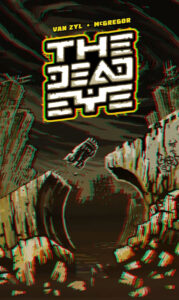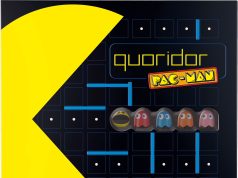 Pleasant Company Games is a small publisher that I always try and keep an eye on. I first played one of their games back in 2014, a dice rolling game called Ancient Terrible Things. They only release a game every few years, but I’ve enjoyed almost all of them.
Pleasant Company Games is a small publisher that I always try and keep an eye on. I first played one of their games back in 2014, a dice rolling game called Ancient Terrible Things. They only release a game every few years, but I’ve enjoyed almost all of them.
Their latest title is called The Dead Eye, a solo game that will have you trying to survive on an inhospitable planet. It’s a quick-playing, card-driven game that will test your luck and maybe your card counting skills.
Gameplay Overview:
The goal in The Dead Eye is to complete three “runs”, which basically breaks the game into a 3-part mini campaign. Each run should probably take you about 10-20 minutes depending on your luck and decision making.
Every turn in a run is broken out into three parts.
1. Unlock a destination: Check the total distance on cards in your distance stack. If the total distance is at least equal to the requirement of the card on the top of the destination deck, you can add it to your target zone.
2. Face a new encounter: If empty, choose a card from either your target zone or draw the top card of your deck and add it to your encounter slot.

3. Resolve the encounter card: Each encounter card has two sides, a heat side, and a juice side. If the number of heat icons on cards to the left of the encounter card ever equals the heat level on the encounter card, the bad result happens. If not, check the other side of the card and see if you have enough juice icons to successfully resolve it, if so, good things happen. If neither of those is at the right level, you reveal the top card of your draw deck and add the card to the matching side of the encounter card (heat or juice). Then a new round starts.
You’ll take turns like this, changing up only when you complete or fail an encounter card. Failing a card will usually cost you either hope or strength. These are extra cards (you start with 5 of each) that are added to your discard pile when drawn. Strength always adds heat cards, while hope adds juice cards. If either of these decks runs out and you need to draw a card, you fail the run.
Successfully completed encounter cards will usually gain you either distance or an item for your rig. These will let you break the rules in a variety of ways such as letting you bury cards, lose heat, or evade encounters. The ultimate goal is to make it to the safe haven and finish the run. If so, you’ll reset some cards and move on to the next run. Make it to the third safe haven and you win.

Game Experience:
The Dead Eye packs a solid gaming experience in a little package. Although the game comes with a board, you can really play without it if you want an even smaller table space. But overall I enjoyed the core gameplay loop and it even reminded me of the excellent deck-building game Friday. You will be encountering cards, hoping to either get them out of your deck (in the case of heat cards) or add them to your rig if they are items. You start off relatively weak, but a few early items (or removal of heat cards) can turn the tide in your favor.

The gameplay definitely has some push your luck elements to it, but a big way to gain an advantage is to be aware of what’s remaining in your deck. If you can do a little bit of card counting, you can know if your draw deck is heavy in juice or heat. I try and use that to my advantage when I’m deciding if I want to try and tackle a distance card with a stiff penalty or good reward.
The Dead Eye also has a decent amount of replay value. While the core gameplay doesn’t really change, and the distance deck is static, the variability of the hope and strength deck gives this one a bit more legs than you’d expect. There are 12 cards in each of those decks and you’ll start each game with 5 random ones of each. After you finish each run, you’ll kick one out and add a new one. This means that you won’t be able to count on specific items from those decks from game to game. That being said, they don’t alter the gameplay that much, so things could potentially get a little samey after enough time.

I’d be remiss if I didn’t mention the art and production values with The Dead Eye. This one is a bit unusual because the whole game is in 3D with a few pairs of retro red and blue style glasses included with the game. Putting the glasses on causes the artwork to pop up as you’d expect if you’ve ever looked at a stereoscopic image. Thankfully though, the glasses aren’t required to play the game as they gave me a bit of a headache after a while. All of the text is in 2d and completely legible with or without the glasses. The artwork is the usual pop art style from Rob van Zyl that I’ve come to love from Pleasant Company Games.
Finally, The Dead Eye is one of those games where things will only get easier and quicker the more you play. After enough games, I was burning through all three runs in about 15-20 minutes. This makes it great for a quick filler or something to do while watching your favorite sports team on tv. I’ve played on my coffee table a few times while watching an episode of Shark Tank.
Final Thoughts:
The Dead Eye is a great little card game that can easily find a home with any gamer who enjoys solo games. The card mechanics are pretty easy to pick up, and once you have a feel for the core gameplay loop, you can blast through games in no time. The replay value will depend on how much you feel changing up the items affects the game. After enough games, plays might feel a little similar, but that’s ok. As a quick filler game that can be played just about anywhere, it excels.
If you get a copy of The Dead Eye, I would recommend sleeving your cards (I sleeved mine, but it doesn’t come with sleeves), as you’ll be shuffling your deck a lot and the mash shuffle is the easiest way to speed that up.
Final Score: 4 Stars – Another great offering from Pleasant Company Games that will easily find a home on the shelf of anyone who enjoys solo games.
 Hits:
Hits:
• Easy to learn rules
• Fun gameplay mechanics
• Nice variety between runs
• Low tablespace reqiurements
Misses:
• 3D art won’t be for everyone
• Might get samey after a while





















